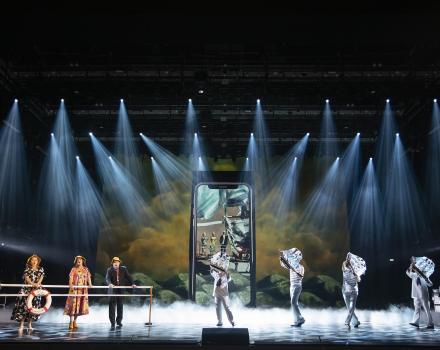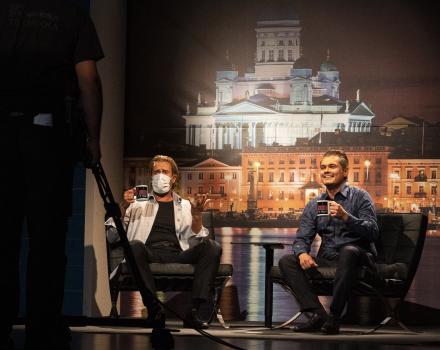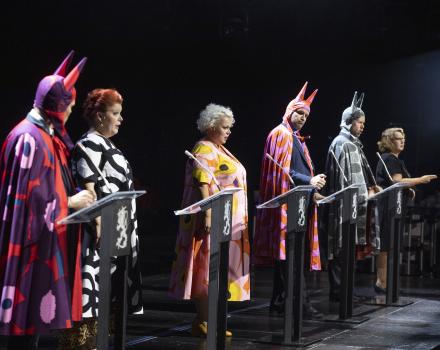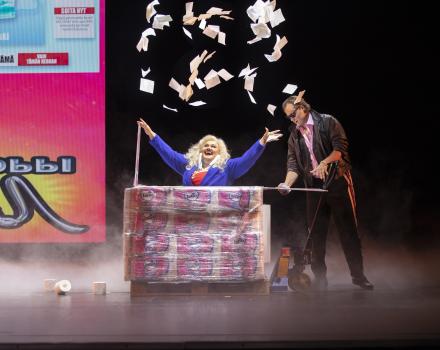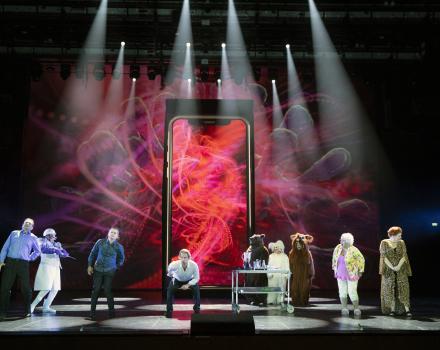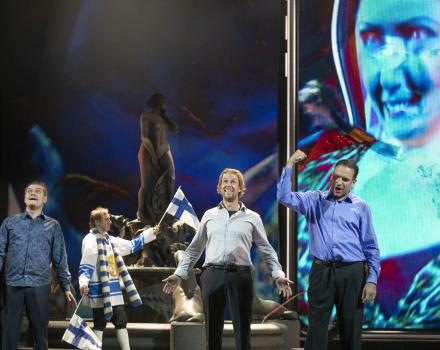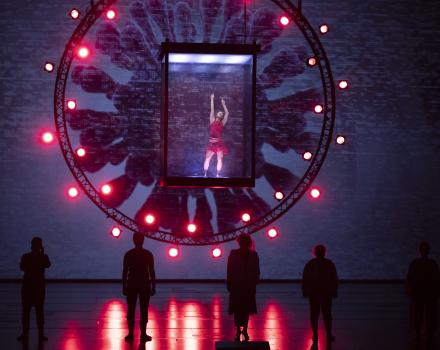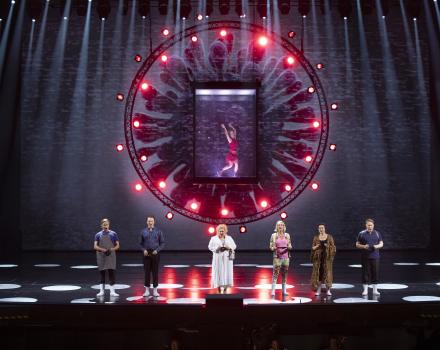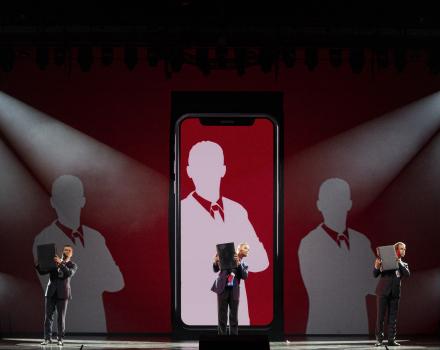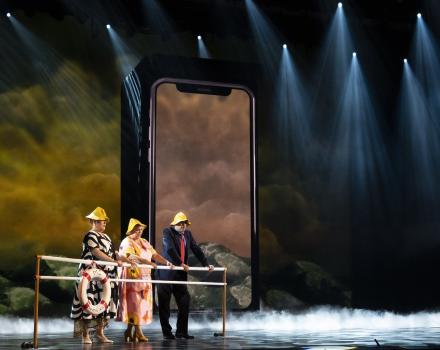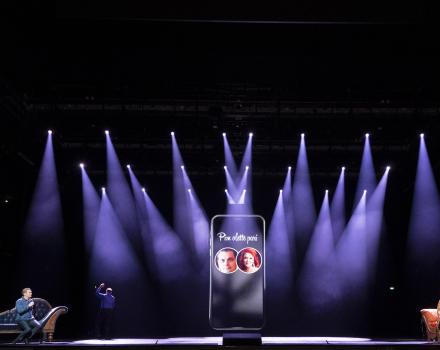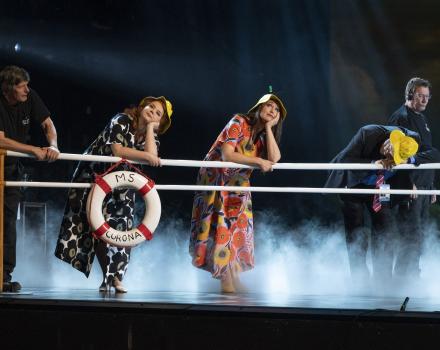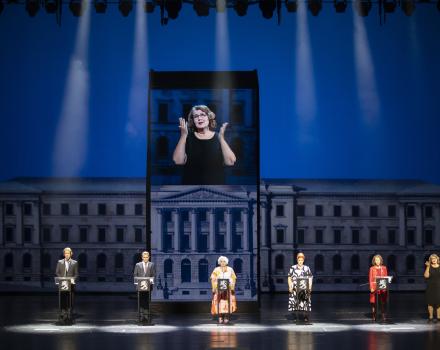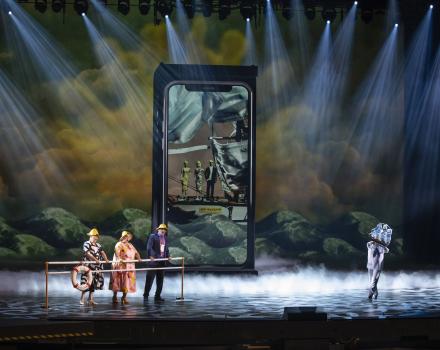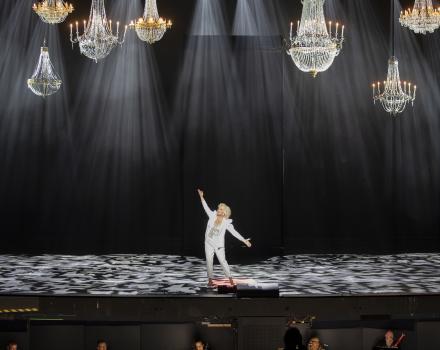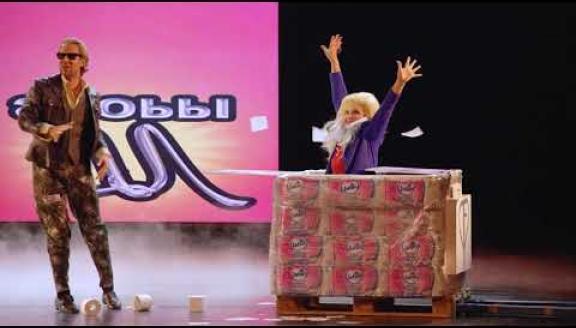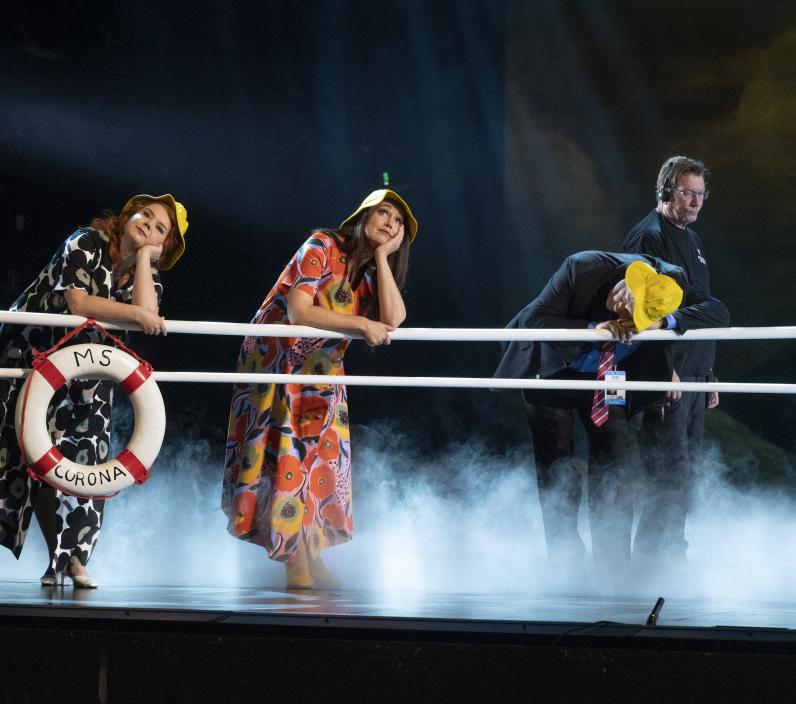

On stage, singers are rehearsing Die Walküre, when they are suddenly interrupted. As management has been laid off and the news of a global virus spreads rapidly, the Wagnerians are suddenly instructed to perform a modern satire on the situation.
Covid fan tutte satirically revisits Mozart's classic opera by adapting its storyline to reflect Finland's experience during the coronavirus crisis. Starring Karita Mattila and conducted by Esa-Pekka Salonen, the production lightheartedly follows ordinary Finns’ lives amid press conferences by the government and pandemic experts. The libretto for Covid times is by Minna Lindgren; the music is (almost) 100% Mozart's.
Cast
Despina | Karita Mattila |
|---|---|
Fiordiligi | Miina-Liisa Värelä |
Don Alfonso | Tommi Hakala |
Dorabella | Johanna Rusanen |
Ferrando | Tuomas Katajala |
Guglielmo | Waltteri Torikka |
Interface manager | Sanna-Kaisa Palo |
Mouzart | Ylermi Rajamaa |
Covid virus | Natasha Lommi |
Sign language interpreter | Outi Huusko |
| ... | |
Music | Wolfgang Amadeus Mozart |
|---|---|
Conductor | Esa-Pekka Salonen |
Director | Jussi Nikkilä |
Sets | Mark Väisänen |
Lighting | Mikko Linnavuori |
Costumes | Erika Turunen |
Text | Minna Lindgren, after Da Ponte |
| ... | |
Video
The story
The Finnish National Opera is trying to persevere in exceptional circumstances. On stage, Wagner singers have been preparing to perform Die Walküre as planned. Most of the management has been laid off, so the situation is monitored by the interface manager, who switches the production to a satirical adaptation of Così fan tutte. Both Mozart’s music and the storyline that lampoons the Finnish reaction to the coronavirus outbreak is a new departure for the Wagnerians.
The star soprano arrives a little late. Her international tour has been cancelled. The Finnish National Opera unexpectedly offers her a job. Soon, however, the singers tire of the temporary project. The soprano and tenor experiment with workplace romance, but the social distancing measures and the interface master disrupt their intentions. The interface manager has found a doctor, who will test a vaccine he has developed on the singers.
Suddenly, the personification of Covid begins to appear to everyone. No one knows whether the sight is true, an illusion, or a symptom of a disease. Only the star singer remains sane and leaves for Paris after receiving a flight ticket. Finally, a better future is sung, a time when the economy has recovered and Wagner can be sung in the opera at last.
Insights
Mozart in Helsinki
In Mozart’s time, performers did not shy away from modifying operas, swapping arias, skipping boring or technically challenging sections and touching up the libretto. The notion of an original, authentic work of art is a modern invention. The Finnish National Opera’s 2020 production throws such scruples overboard and radically updates Così fan tutte. The result is a satirical look at the experience of the coronavirus outbreak in Finland in the spring.
Mozart was a mischievous and imaginative fellow who wasn’t chained to conventional thinking. He would probably be very excited about this project.
The composer and principal conductor of the Philharmonia Orchestra in London, Esa-Pekka Salonen flew to his hometown Helsinki when the pandemic broke out, where he dreamt up the project with the Finnish soprano Karita Mattila.
‘We’re not laughing at the Covid-19 tragedy and crisis. The work simply tells about the reality we’ve been living in,’ Salonen makes clear. ‘Opera is often accused of not living in modern times and not reacting quickly to contemporary issues. This work now deals with our times and people.’
Such a rapid response was possible as Covid fan tutte was created in less than six months instead of the usual several years it takes to stage a new opera. The librettist Minna Lindgren, who completely rewrote the libretto for the production, reflects on the lack of time at hand: ‘even Mozart knew that the impresario raging behind the door is an artist’s best inspiration.’
I believe we’ll be able to laugh or at least smile at our shared experiences once we see how well they go together with Mozart’s music. This opera is not about a serious illness, people’s fears, or even about death. I hope that the unique magic of Mozart’s opera can make us all stop and enjoy a simple story put to music.
The decision to perform a condensed update of Così fan tutte was strategic, as the opera can be performed with a small orchestra and without a chorus to ensure social distancing. As Così fan tutte is a number opera consisting of individual pieces of music, Lindgren was able to cherry pick the arias that best suited their outline. ‘We needed one carefree duet, one tender aria, another fervently energetic one, and one full of rage. A determined quintet opens the Government’s press conference, while the tender one brings to mind the frailty of the elderly.’
In the new, fragmented story, Lindgren left out the recitatives and took what she called ‘Mozart’s contemporaries’ approach to copyright‘ by giving Jussi Nikkilä’s team complete liberty to edit her lines. The original order of music was shuffled in order to skip over unnecessary plot twists. Despina’s role, interpreted by Mattila, became more important in this version and the soprano steals the baritone parts of Guglielmo and Alfonso on more than one occasion. Attentive listeners will recognise an aria from Don Giovanni and another from The Magic Flute. A special treat is a rarely performed alternative baritone aria from the world premiere of Così fan tutte in Vienna. The necessary interludes, keyboard parts and the flip in the overture were penned by Esa-Pekka Salonen.
What you will experience here is a Mozart opera as you have never heard it before: sung in Finnish, joyfully irreverent and absolutely topical. Covid fan tutte: no one else does it (like the Finnish National Opera).
Gallery
